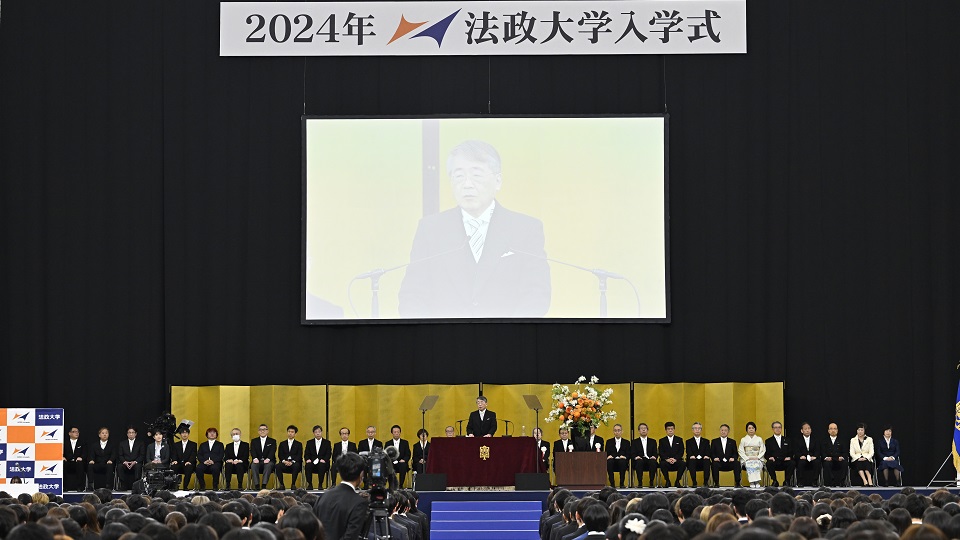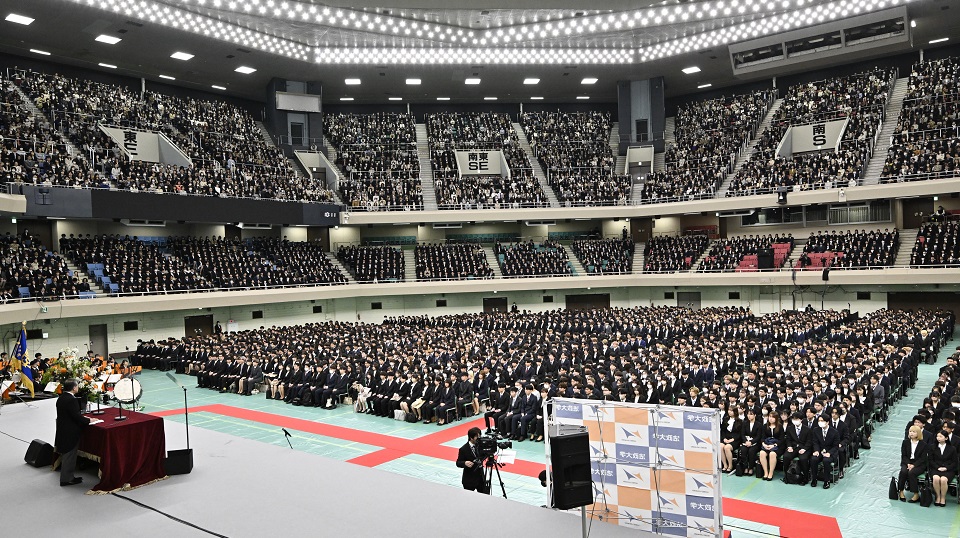News & Event
President’s Address 2024 Entrance Ceremony
Congratulations to all our new students! I’m Hosei University president Katsuya Hirose, and it’s my great pleasure to welcome you to Hosei. I also extend my warmest congratulations to all family members joining us today.
I wonder how you’re feeling at this moment when your university life is about to begin. I suspect that quite a few of you know almost no one else in this crowd of new entrants. For most of you, university life will also be a new experience. Whenever I start something new, I always feel a bit nervous and anxious but also elated to be setting out on a new path. I also know that if I pour myself heart and soul into the new endeavor, a great sense of achievement and satisfaction await. So, I urge you to treasure the way you feel today, the stress and the unease included, as you go forward into your university years.
Hosei University celebrates its 144th anniversary this year. Our history traces back to the spring of 1880, when three young men in their 20s opened Japan’s first private law school. At a time when a framework had yet to be established for elementary schools, let alone for universities, they created a law school with their own hands because they believed that Japanese society would need people with a knowledge of modern jurisprudence. They felt that embedding the study of law into society would be critical in achieving modernization and establishing people’s rights in the modern sense. Today we would say that they created a law school as a venture for the purpose of resolving social issues. For the first few years, they apparently faced major management difficulties, which they finally overcame when the lecture transcripts they published were snapped up by the public. Back then, there was a great thirst for legal knowledge, and it was by responding to that need for the latest knowledge that this youthful venture continued to thrive, eventually becoming a large-scale university.
One concept has remained foundational throughout Hosei University’s history from the early Meiji period through to today, even through periods of tumult: freedom. We need a society which does not regard freedom as the right of the powerful to do what they like, but rather recognizes that everyone has the right to be free, regardless of their power. In other words, we need to create a civilized society in which rights are guaranteed by law. That was why a little school was established to study law. Along the way, it grew from a professional school teaching only law into a university offering a comprehensive education, gathering teachers who were disciples of Natsume Soseki and developing a liberal academic culture.
For many years, the Hosei University spirit was consequently embodied by the phrase “freedom and progress.” Recently, however, with the year 2030 and our 150th anniversary just ahead, we revisited the expression of our identity, resulting in the 2016 formulation of a university charter entitled “Practical Wisdom for Freedom.” This phrase articulates Hosei University’s pact with society in terms of what kind of university we are, what kind of people we will cultivate, and what kind of research outcomes we will produce. In a brief one-page statement, the charter succinctly captures the essence of Hosei’s history and lays out our vision for the future. It’s displayed in various places around the university, and I encourage you to take this moment at the start of your university life to read it afresh with a strong sense of ownership.
So, what is this prized freedom? Firstly, it is freedom from unwanted constraints. Not suffering from gratuitous constraints imposed by others is certainly an important aspect of freedom, but constraints imposed by others are not all that deprive us of freedom. We can also unconsciously constrain our own freedom when our assumptions and preconceptions prevent us from being able to recognize objective facts. Unwittingly imposing major constraints on one’s self is something that can happen to anyone, and indeed often does.
The intangible nature of these unconsciously self-imposed constraints makes them difficult to overcome. The only way out is to learn. Learning demonstrates its power at the deepest level in these situations. Academic knowledge grows from various individuals’ pursuit of truth, followed by the rigorous testing of their results by other individuals. Engaging seriously with such knowledge frees you from the inadvertent trap of assumptions that prevent you from nursing doubt. Freeing yourself in this way is a very exciting experience, and university offers an abundance of opportunities for that excitement. But I must warn you that the experience of acquiring freedom does not come from simply memorizing and reproducing knowledge. The chance to gain more freedom only arises when you look at the knowledge that someone else has produced and try to imagine the issues they faced and the process they went through to reach it, and then you put in the effort to make that knowledge your own. Getting credits and getting a degree are not goals in themselves. They’re means of gaining yourself more freedom. Applying yourself seriously and with a sense of ownership to your studies is essentially the embodiment of “practical wisdom for freedom.” And I should add that the regular curriculum—in other words, acquiring the necessary credits to graduate—is not the only way you can learn. Many learning opportunities arise through extracurricular activities and through play. Setting aside time to relax and do absolutely nothing is another learning opportunity—a chance to make discoveries that will set you free.
University also offers the chance to encounter a broad spectrum of people in your quest for the learning that will set you free. Try to include among your friends and acquaintances people that you perceive as being different from you. Making friends with people with whom you have things in common tends to happen effortlessly, and of course that’s important too. The real gold, though, lies in getting to know people with whom you have very little in common. You’ll have to make a conscious effort, but if you can succeed, you’ll expand both your horizons and your capabilities. Hosei University is a comprehensive university with 15 faculties in the three fields of the humanities, social sciences, and natural sciences, as well as graduate schools in most of these areas. Students with a variety of interests and strengths are engaged in study and research in a range of specialist areas. Our diverse student body comes from all around the country and the world. While different interests and strengths also mean different specialist areas, I urge you to actively seek out chances to interact with people in different fields to yours and get to know them. They don’t all need to be fellow students, either. Hosei constitutes an array of individuals of different ages and with different experience to students—lecturers and staff, for example. They love working with you and see it as their mission. Please put differences in position aside and regard them as colleagues engaged in a shared quest.
Interacting with people with different viewpoints to you is very exciting and offers many insights and lessons. You can make discoveries and achieve things beyond your personal capacity. This doesn’t mean deliberately seeking out a partner who can do things that you can’t. The way that it often ends up working in reality is that you’re surprised and shocked to stumble across someone with qualities that you don’t have or the talent to do things that you can’t do, or who is putting their heart into something that you could never have dreamed of attempting on your own accord, and that leads to an acquaintance that later leads to working together in a different context, producing amazing results as a consequence.
I hope that at Hosei University, numerous such experiences and a strong commitment to your studies will enable you to gain more freedom and provide you with a “practical wisdom for freedom” that will stay with you even after graduation. I wish you a very productive student life.



